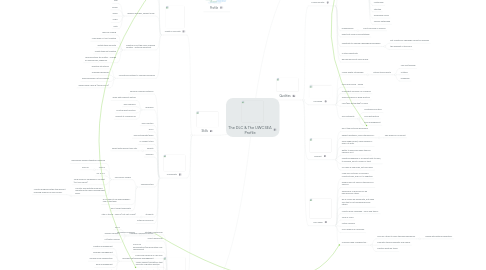
1. Thinking
1.1. Strategic resourcing
1.1.1. Succession planning
1.2. Smart resourcing
1.3. Focus on amplification/transformation over replacement
1.4. Avoid over reliance on Skill Drill
1.5. Video Games/Simulations that promote cognitive demand
1.6. Anticipation beats reaction
1.6.1. Proactively address issues
1.7. Smart reactions minimise implications of failure
1.8. Tactical tool use, use what you have effectively before you try something new.
1.9. Just because it's new doesn't mean it's better
1.9.1. Just because it's better doesn't mean it's the solution we need. now.
1.10. Plan for the complexities of interacting with varied groups and multiple agendas.
1.11. Avoid replacement tech, plan for amplification or ideally transformation (RAT)
1.12. Critical thinking is critical
1.12.1. Just because everyone is doing it, doesn't mean we should be doing it.
1.12.2. Scepticism over cynicism
1.12.3. WWWHWW?
2. Skills
2.1. Create & Innovate
2.1.1. Creative tools
2.1.1.1. iMovie
2.1.1.2. Pages
2.1.1.3. Prezi
2.1.1.4. Murally
2.1.1.5. Minecraft
2.1.2. Anticipate, then innovate
2.1.3. Old tools in new ways beats new tools in new ways.
2.1.4. Balance domains, neglect none.
2.1.4.1. Text
2.1.4.2. Image
2.1.4.3. Audio
2.1.4.4. Video
2.1.4.5. Data
2.1.5. Creating is not the same as being creative - both are important.
2.1.5.1. Learn by making
2.1.5.2. Make even if it isn't creative
2.1.5.3. Imitate then innovate
2.1.5.4. Create then get creative
2.1.5.5. Learning styles still matter - a range of experiences, enhances
2.1.6. Innovative solutions to complex problems
2.1.6.1. logistical structures
2.1.6.2. simplified workflow
2.1.6.3. avoid surprises if at all possible
2.1.6.4. always have a plan B (and a plan C)
2.2. Collaborate
2.2.1. Personal Learning Network
2.2.2. Research
2.2.2.1. Share with relevant parties
2.2.2.2. read research
2.2.2.3. practise best practice
2.2.2.4. Present at conferences
2.2.3. Tech Mentors
2.2.4. DLCs
2.2.5. Tech Enthusiasts/Reps
2.2.6. IT Support Staff
2.2.7. Parents
2.2.7.1. Parent with relevant skill sets
2.2.8. Teachers
2.2.9. Teaching Staff
2.2.9.1. Curriculum leaders
2.2.9.1.1. Benchmark based integration planning
2.2.9.1.2. TPACK
2.2.9.1.3. AfL & ICT
2.2.9.1.4. Tech driven by Pedagogy & content (not vice versa)
2.2.9.1.5. Monitor and facitate grade and departmental iLearn development goals.
2.2.9.2. DLCs need to be approachable - one of the team
2.2.9.3. Don't forget specialists
2.2.10. Students
2.2.10.1. Stay in touch - TEACH (not just coach)
2.2.11. External resources
2.2.12. Coaches coaching coaches
2.2.12.1. DLCs
2.2.12.2. Teacher librarians
2.2.12.3. Lit/math coaches
2.3. Self-Manage
2.3.1. Efficient file/resource management
2.3.1.1. Desktop management
2.3.1.2. Calendar management
2.3.1.3. Google Drive Organisation
2.3.1.4. Email management
2.3.1.5. Reminder systems
2.3.2. central online repository of resources
2.3.3. Less systems more effeciently used
2.3.4. Allocates resources fairly and effectively
3. Profile
4. Concerned & Committed
4.1. Digital Citizenship - Kindness in criticism
4.2. Commitment to complete projects
4.3. Less printing!
4.4. Coach until completion
4.5. empathy is essential - teachers have other priorities than iLearn
4.6. Be a teacher with teachers, a student with students, and a parent with parents.
4.6.1. All things to all people in order that you might persuade some.
5. Qualities
5.1. Communicator
5.1.1. Professional presentation
5.1.1.1. Workshops
5.1.1.2. Provision of PD
5.1.1.3. Facilitating CPD
5.1.1.4. written or spoken
5.1.1.5. In person or at a distance
5.1.1.5.1. Face to face
5.1.1.5.2. 1:1
5.1.1.5.3. Small group
5.1.1.5.4. Large groups
5.1.1.5.5. Internal and external
5.1.1.5.6. Email
5.1.1.5.7. Blog
5.1.1.5.8. eBrief
5.1.1.6. Multimodal
5.1.1.7. Situated
5.1.1.8. Accessible online
5.1.1.9. Socially networked
5.1.2. unambiguous
5.1.2.1. Don't presume or assume
5.1.3. direct but never confrontational
5.1.4. Negotiate to manage challenging individuals
5.1.4.1. But sometimes challenge cannot be avoided
5.1.4.2. the elephant in the room
5.1.5. Cultural sensitivity
5.1.6. Be persuasive but never pushy
5.2. Principled
5.2.1. Model Digital Citizenship
5.2.1.1. Intellectual property
5.2.1.1.1. Fair use/dealings
5.2.1.1.2. Citation
5.2.1.1.3. plagiarism
5.2.2. UWCSEA profile - online
5.2.3. Consistent provision of coaching
5.2.4. Avoid enclaves of good practice
5.2.5. Less (well distributed) is more.
5.2.6. Accountability
5.2.6.1. Timetable allocation
5.2.6.2. Time distribution
5.2.6.3. Time management
5.3. Resilient
5.3.1. Don't take criticism personally
5.3.2. Expect resistance, even interference...
5.3.2.1. This keeps DLCs honest
5.3.3. Encourage honest, open feedback - even if it hurts
5.3.4. Better to know bad news than be oblivious of it
5.3.5. Negative feedback is an opportunity to learn, to improve, and it's a sign of trust.
5.3.6. No news is bad news, not bad news.
5.4. Self-aware
5.4.1. Make sure criticism is received constructively, even if it is negative
5.4.2. People may not see you the way you see you.
5.4.3. Awareness of how we can be perceived by others
5.4.4. By all means be passionate, but make sure that is not overwhelming for others.
5.4.5. Monitor body language - yours and theirs...
5.4.6. Tone of voice
5.4.7. Listen carefully
5.4.8. Only respond if necessary
5.4.9. Coaches need coaching too...
5.4.9.1. Time as a team to work through differences
5.4.9.1.1. Maybe with external expertise?
5.4.9.2. Deal with tension honestly and openly
5.4.9.3. Practise what we teach
